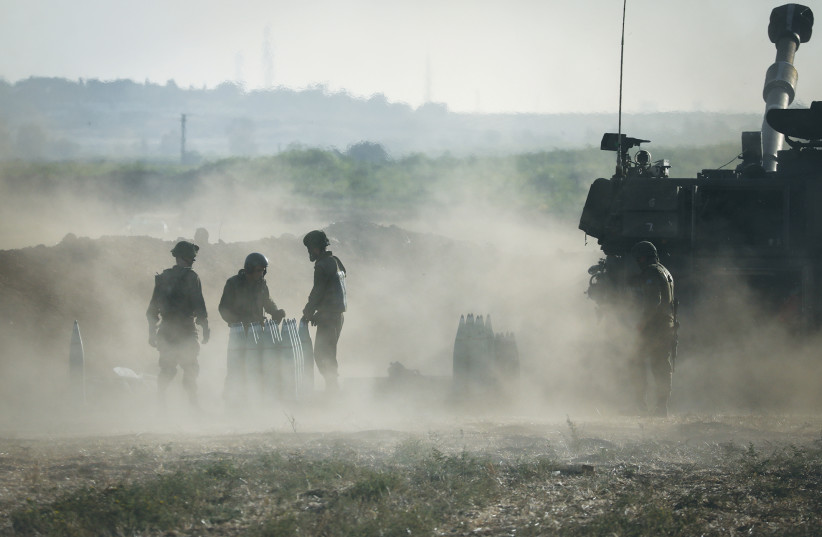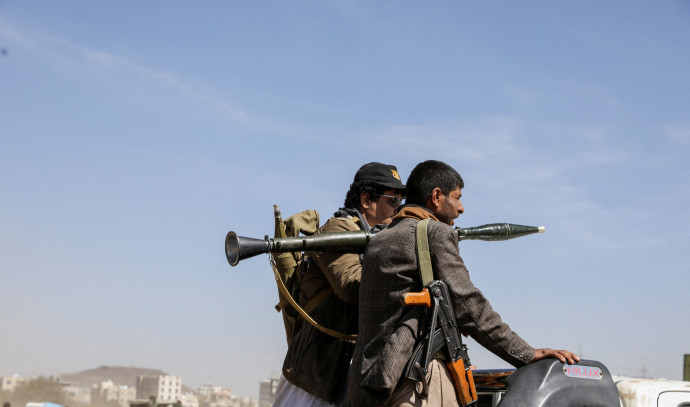world news
Israel complied with int’l law in Gaza war against Hamas – JINSA

In addition, the report found that despite accusations from human rights groups that Israel violated international law, some Israeli precautions actually exceeded “those implemented in recent US combat operations that we participated in, despite confronting an adversary that often sought to exacerbate that risk deliberately,” the report said.
The authors included about a dozen senior and retired US military officers who traveled to Israel to examine the actions of both sides, and included: Lt.-Gen. Robert Ashley, former director of the Defense Intelligence Agency, Lt.-Gen. John M. Bednarek, former senior defense official in Iraq, Lt.-Col. Geoffrey S. Corn, the former chief international lawyer for US Army Europe and others.
If the IDF was mostly focused on degrading Hamas’s attack capabilities, the Gazan terror group was equally investing resources in a massive disinformation campaign to delegitimize Israel alongside its firing of rockets at Israeli civilians.
IRON DOME interceptors destroy rockets launched from the Gaza Strip toward Israel in the skies over Ashkelon in May. (credit: AMIR COHEN/REUTERS)
Comparing the Israeli experience to potential future challenges which the US may face, the report said: “The ability of an unscrupulous adversary to constrain military operations or even achieve strategic advantage against a much more capable opponent through the use of human shields and disinformation about both facts and law is a particularly concerning harbinger of what the United States might soon face.”
JINSA said that the US “will have to contest such conflicts emphatically, and preemptively, in the information domain as much as in the physical. The US military should train to operate in environments significantly more complex than Gaza – just as densely populated by civilians, but farther afield, with more limited intelligence, no air dominance, and a contested electromagnetic spectrum – while remaining committed to LOAC compliance.”
At the same time, the report said, “the US military must also be clear-eyed about setting realistic expectations for what that compliance will look like in such operations – it might not be feasible to take the same extraordinary but costly precautions Israel employed in Gaza.”
“Investments, together with partners like Israel, in new technologies to counter enemies’ advancing capabilities and enable mitigating risk to civilians will be critical,” it continued.
Getting more specific, the report said that, “the IDF has robust processes in place to ensure legal vetting of proposed targets, specific method of attack, and potential incidental injury and collateral damage. Its operations adhered to LOAC’s mandate to implement all feasible precautionary measures to mitigate risk to the Gazan civilian population.”
“Numerous leaflets were dropped, telephone calls were placed to residents, and text messages were sent to warn Gazan civilians to leave a defined area of operations in advance of airstrikes,” said the report.
JINSA stated that, “minutes preceding the actual attack, small munitions delivered a ‘knock on the roof’ to provide further warning of the impending attack – a tactic first used in 2014 and therefore familiar to the civilian population.”
In addition, “multiple surveillance platforms were dedicated to each target, often for hours, to ensure that civilians evacuated areas of attack. These impressive precautions often came at an operational and tactical cost to the IDF, allowing belligerents to escape, diminishing the tactical advantage of surprise, and reducing the number of other targets that could be monitored or struck,” it said.
Next, the report noted the May war was the “first artificial intelligence (AI) war” in which the IDF employed “AI algorithms and machine learning, paired with intelligence analysts in ‘man-machine teams’ to flag and review potential targets… that were significantly more detailed, accurate, and timely than in 2014.”
The report accepted Israeli estimates that out of 264 Palestinians killed, 37% were combatants and another 15% were believed to be combatants, and noted that no civilians were killed in precision attacks on 20 high rise towers.
Also, the report said that “the IDF utilized thousands of Israeli and US produced PGMs (Precision Guided Missiles), including small laser-guided bombs (SLGB), GBU-39/B small diameter bombs (SDB) and Joint Direct Attack Munition (JDAM) tail kits that convert unguided air-to-ground munitions to PGMs. With these weapons, the IDF could apply its precise and timely intelligence regarding target locations,” to limit civilian casualties.
Tracking the disinformation campaign against the IDF, the report said that the problem started with, “The media and public’s misunderstanding of how LOAC applies to military operations – especially the false assumption that the effect of an attack, and especially the presence of civilian casualties, determine its legality.”
“Coupled with social media’s ability to transmit graphic images rapidly and globally without explanatory context,” the report said Hamas succeeded at making “audiences more receptive to Hamas’s disinformation that Gazan suffering was evidence of Israeli LOAC violations.”
Numerous organizations, including the United Nations, Amnesty International and Human Rights Watch – organizations claiming to be experts in the relationship between law and military operations – quickly seemed to accept Hamas’s assertions of unlawful IDF operations.
JINSA accused these groups of misunderstanding or mischaracterizing the principle of distinction “to mean that military objectives cannot be lawful targets whenever they are placed in civilian areas. Meanwhile, the principle of proportionality seems to be interpreted as presenting some quantitative (but unspecified) threshold of civilian casualties or destruction of civilian property above which an attack violates LOAC. Neither of these interpretations is correct.”
Also, the report blamed Israel for only using the IDF spokesperson giving narrow details about specific operations and as its main microphone to the world as opposed to using the Foreign Ministry to educate the world about the larger context.
“On their own, without context and explanation, these facts proved insufficient to align the public perception of the legitimacy of IDF operations with the reality of their LOAC compliance,” said JINSA.
Moreover, the report flagged that Israel’s effectiveness in explaining its narrative was “further decreased by delays and several major missteps, including delayed justification for the IDF’s strike on the al-Jalaa building housing international media in Gaza as well as the perception that the IDF intentionally lied to the media about launching ground operations in Gaza.”
Further, the report stated, “we encountered a lingering resignation among military and civilian leaders in Israel that no improvement in their messaging can overcome the rush to condemnation that appears reserved for Israel alone among all nations… But our review also indicates that even if messaging efforts have marginal impact, ceding the information domain to the enemy is an unacceptable response.”
“To improve communications with international media, organizations and publics, militaries should seek more effective ways to rapidly provide more detailed information to the public,” said the report.
world news
Ex-Israeli ambassador: Campus antisemitism is part of an Islamist agenda

Danny Ayalon, former Deputy Foreign Minister and Israeli Ambassador to Washington, called the recent pro-Palestinian protests on campuses “an Islamist agenda that did not start today.”
Ayalon stated, “They have already influenced the public opinion in Europe in their favor and are trying to replicate the process in the US. From this perspective, they are succeeding, and they are, in fact, trying to influence not only Biden and the government but also members of Congress. Currently, Trump is leading in at least five states. Everything is subject to the American electoral system.”
Ayalon continued, “There are two axes through which Americans have been operating from the beginning of the war until today: the strategic axis, strong support for Israel, Israel’s strength is a clear American interest, and not to expand the war, and on the other hand, Biden’s political interest. He wants quiet; he wants stability. He would, of course, prefer to see a breakthrough. If he could run these elections on an agreement between Israel and Saudi Arabia, that would be his dream. It is not beneficial for Biden to encourage escalation of the fighting.”
The American influence on the Israel-Hamas conflict
Ayalon also noted that “From all the conduct of Hamas, the IDF controls 90 percent of Gaza, and they are negotiating as if they hold the upper hand. They think they have the advantage and need to hold out as long as possible until the American elections.”
“The prominent guiding line is the evident interests of Biden and the Democrats. There are about five key states where this conflict will be decided by the electoral system. In some states, like Michigan, there is a relatively large Arab Muslim concentration, and a small percentage one way or the other can shift the entire state from one side to the other. That’s exactly Biden’s dilemma,” Ayalon concluded.
Edited by Shani Romano for 103FM radio.
world news
Israeli student at Columbia University: “They broke into the building and broke windows”

Udi Segal and Tal Shalev spoke this Wednesday morning on 103FM radio with Omer Lubaton Granot, an Israeli master’s student at Columbia University, who shared his feelings after the widespread pro-Palestinian protests on campus as a reaction to the Israel-Hamas conflict.
“I’m okay, but outside, it’s chaotic like you wouldn’t believe,” he shared, “There are dozens, if not over a hundred, detainees. We are following directions. The students from the protest yesterday broke into the building and shattered windows.”
Despite the chaos, Granot recognized some good things that came out of the campus protests.
“It gave the university a reason to investigate matters they’ve avoided for a long time. There is a lot of criticism about maintaining freedom of expression because it is sacred here, but the students went too far. They closed the campus today. No one could enter.”Lubaton Granot continued, “It’s been disrupting the daily routine here for two weeks already. There are people with covered faces walking around here, waving terrorist flags, shouting ‘Zionists out,’ preventing Israelis from freely walking on campus.”
“At a certain point, we waited for the police to come and take assertive action against them. The president asked the police to stay on campus until May 17. There is a need for constant police presence even though they are not a mob, this is not London, and there are not 100,000 protesters here,” he noted.
“I read in several places, but not sure if it’s confirmed, that among [the protesters] there was a relative of a man who was convicted of terrorism and unrelated to the university. Among the protesters are all sorts of people who are professional provocateurs. But in the end, they are coordinated, inside and out.”
“These are the same organizations where many of their leaders are simply on the outside,” he concluded and said, “There is a sense of personal threat, and we keep looking over our shoulders. We’re careful where we speak Hebrew on campus. We are remaining cautious. Since the beginning of this whole thing, it’s been really scary.
world news
Missiles attack inflicts damage to vessel SW of Yemen’s Mokha

Three missiles were sighted approximately 15 nautical miles southwest of Yemen’s Mokha, British security firm Ambrey said on Friday, and the United Kingdom Maritime Trade Operations (UKMTO) said that one vessel was damaged.
“The Master has reported two attacks. The first attack, the vessel experienced an explosion in close proximity to the vessel, which was felt by the crew on board,” UKMTO said in an advisory note.
“Subsequently, the second attack on the vessel, consisted of what is believed to be two missiles, which resulted in damage to the vessel,” UKMTO added.
Russian-linked ship attacked
The tanker, which was not identified by name, was en route from Pimorsk, Russia, to Vadinar, India, when it was attacked, Ambrey said in its advisory note.
“A Panama-flagged tanker, formerly UK-owned before its ownership changed in November 2023, was the closest vessel to the sighting,” Ambrey’s note said.
“At the time of writing, the vessel’s owner was Seychelles-registered and was engaged in Russia-linked trade,” Ambrey said of the tanker that was attacked.
The note said the vessel was transmitting an Automatic Identification System (AIS) signal.
Months of Houthi attacks in the Red Sea have disrupted global shipping, forcing firms to re-route to longer and more expensive journeys around southern Africa, and have stoked fears that the Israel-Hamas war could spread to destabilize the wider Middle East.
The United States and Britain have carried out strikes against Houthi targets in response to the attacks on shipping.
The Houthis since November have attacked more than four dozen ships, taking possession of one and sinking another. The barrage of assaults had eased in recent weeks amid US-led airstrikes and a sharp drop in commercial vessel voyages through the Red Sea and the Gulf of Aden.
-

 Solar Energy3 years ago
Solar Energy3 years agoDLR testing the use of molten salt in a solar power plant in Portugal
-

 Camera3 years ago
Camera3 years agoCharles ‘Chuck’ Geschke, co-founder of Adobe and inventor of the PDF, dies at 81
-

 TOP SCEINCE1 month ago
TOP SCEINCE1 month agoStellar winds of three sun-like stars detected for the first time
-

 TOP SCEINCE1 month ago
TOP SCEINCE1 month agoBrightest gamma-ray burst of all time came from the collapse of a massive star
-
world news1 month ago
Jewish diaspora expresses concern as Iranian drones launch toward Israel
-

 TOP SCEINCE1 month ago
TOP SCEINCE1 month agoInherited predisposition for higher muscle strength may protect against common morbidities
-
world news6 months ago
Gulf, France aid Gaza, Russia evacuates citizens
-

 Camera3 years ago
Camera3 years agoSony a7 IV sample gallery

